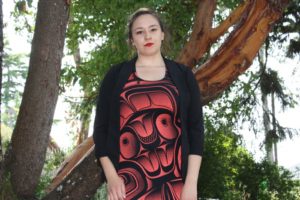The federal Liberal government hasn’t followed through on campaign promises that impact indigenous learners, according to one student group. The Canadian Federation of Students-British Columbia (CFS-BC) says that the Justin Trudeau government promised to remove the two-percent cap on the Post-Secondary Student Support Program (PSSSP), which is how bands get their funding to send people to postsecondary, and they haven’t.
“Trudeau promised to remove the cap, in addition to investing $5 million into postsecondary education in this budget,” says CFS-BC Aboriginal Students’ Representative and Camosun student Shayli Robinson, “and indigenous postsecondary wasn’t even addressed. So it’s him not keeping his promises and letting indigenous people down.”
CFS-BC Chairperson Simka Marshall wishes Trudeau would follow through with his campaign promises and the obligation he has to indigenous learners in Canada, “and remove the funding cap for indigenous students and add whatever funding is needed to the program to clear the backlog and ensure that indigenous students don’t have to be turned away from colleges,” says Marshall.
The federal Liberal government did not reply to interview requests by deadline.

Camosun College Student Society (CCSS) First Nations Director Jackson Traplin says that the Liberal government’s budget shows them “reneging on their election promise to increasing funding by some $50 million per year.
“This is problematic, as it is in stark contrast to a TRC [Truth and Reconciliation Commission of Canada] recommendation insisting on more adequate funding for First Nations seeking college- and university-level educations,” he says. “Compounding that factor is the two-percent cap on First Nations education funding, which, incidentally, has been in place since 1996 and has not kept up with the rising costs of tuition fees.”
Traplin says that he has spoken to at least one First Nations student at Camosun who is “in a quandary” because his band denied him funding for the spring semester.
“As it has been stated, a rising tide lifts all boats,” says Traplin. “A government that follows through on its commitment to First Nations education will, by and large, benefit the country as a whole.”
Marshall says education is crucial to Canada’s indigenous communities, and adds that a lot of indigenous youths are going to enter the workforce in the next few years.
“The rate of unemployment in the indigenous population is really high, and education is a good way to combat that issue,” she says. “And, also, right now in Canada only eight percent of indigenous people hold a degree, compared to 23 percent of the non-indigenous population, so there are a number of reasons why education is really important.”
Robinson says that she and her fellow indigenous students were really excited when the initial promises were made.
“The amount that each band gets from the PSSSP is based on membership,” she says. “I come from a really small band which has just over 200 members, so we hardly get any funding, and because of that my band has had to put really strict guidelines in place and not a lot of people can get it. A lot of other nations have had to do that, because they have a lot of members who want to do that, but they have such limited funding that they need to have a really tough application process in order to get it.”
Marshall says that CFS-BC has been working on lobbying for the removal of the PSSSP cap for a number of years, and says they were “really shocked” when the budget came out and didn’t have the promise to remove the cap in it. She adds that CFS-BC will continue to work to attempt to make the federal government accountable for what they promised.
“We’ve been trying to reach out to coalition partners in BC to try and put pressure on the federal government,” she says, “to make them follow through with their campaign promises.”
With files from Jayden Grieve, contributing writer
